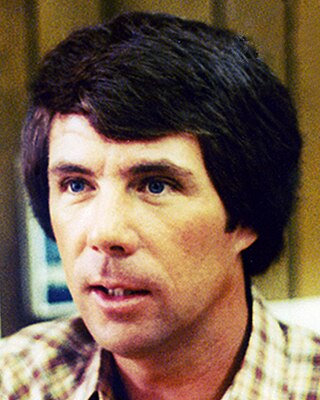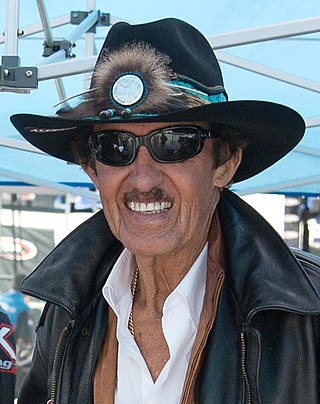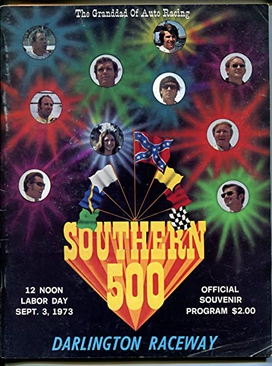The 1976 NASCAR Grand National Winston Cup Series was the 28th season of professional stock car racing in the United States and the 5th modern era NASCAR Cup series. The season began on Sunday, January 18 and ended on Sunday, November 21. Cale Yarborough, driving the #11 Junior Johnson Holly Farms Chevrolet scored his first of three consecutive NASCAR Grand National Series Winston Cup Championships. Skip Manning was named NASCAR Rookie of the Year.
The 1974 NASCAR Winston Cup Series was the 26th season of professional stock car racing in the United States and the 3rd modern-era NASCAR Cup series. The season began on Sunday January 20 and ended on Sunday November 24. The first 15 races were shortened 10 percent due to the 1973 oil crisis. Following criticism of the 1972 and 1973 points systems that placed emphasis on completed miles, NASCAR implemented a new points system, that took basic purse winnings, multiplied by number of starts, and divided by 1,000; it was designed to more directly reward winning races, a response to Benny Parsons' championship the previous year with just one win. Richard Petty was Winston Cup champion at the end of the season finishing 567.45 points ahead of Cale Yarborough, while David Pearson finished a strong third in points despite only nineteen starts. Earl Ross was named NASCAR Rookie of the Year.
The 1979 NASCAR Winston Cup Series was the 31st season of professional stock car racing in the United States and the 8th modern-era Cup series. It began on Sunday, January 14, and ended on Sunday, November 18. Richard Petty won his seventh and final Winston Cup championship, winning by 11 points over Darrell Waltrip. Dale Earnhardt was crowned NASCAR Rookie of the Year.

The 1982 NASCAR Winston Cup Series was the 34th season of professional stock car racing in the United States and the 11th modern-era Cup series. The season began on February 14 at the Daytona International Speedway and concluded on November 21 at Riverside International Raceway. Darrell Waltrip took his second straight championship driving for Junior Johnson by 72 points over Bobby Allison.

The 1976 Mason-Dixon 500 was a NASCAR Winston Cup Series event that took place on May 16, 1976, at Dover Downs International Speedway in Dover, Delaware.

The 1978 Old Dominion 500 was a NASCAR Winston Cup Series race that took place on September 24, 1978, at Martinsville Speedway in Martinsville, Virginia. This race was the 28th to be held as a part of what is now known as the First Data 500.

The 1976 Dixie 500 was a NASCAR Winston Cup Series race that took place on November 7, 1976, at Atlanta International Raceway in Hampton, Georgia, United States.

The 1973 Richmond 500 was a NASCAR Winston Cup Series racing event that took place on February 25, 1973, at Richmond Fairgrounds Raceway in Richmond, Virginia.

The 1975 NASCAR Grand National Winston Cup Series was the 27th season of professional stock car racing in the United States and the 4th season in the modern era of the NASCAR Cup series. The season began on Sunday, January 19 and ended on Sunday, November 12. Richard Petty, driving the #43 Petty Enterprises STP Dodge scored his sixth NASCAR Grand National Series Winston Cup Championship. Bruce Hill was named NASCAR Rookie of the Year. NASCAR introduced a new points system for 1975, a system designed by statistician Bob Latford. For the first time, each race on the NASCAR Winston Cup Grand National schedule carried an equal point value, a system that would be used for 36 seasons, from 1975 to 2010. The original points system ran for the first 29 seasons, from 1975 to 2003.

The 1978 Delaware 500 was a NASCAR Winston Cup Series racing event that took place on September 17, 1978, at Dover Downs International Speedway in Dover, Delaware.

The 1975 National 500 was a NASCAR Winston Cup Series race that took place on October 5, 1975, at Charlotte Motor Speedway in Concord, North Carolina.

The 1981 Mason-Dixon 500 was a NASCAR Winston Cup Series racing event that took place on May 17, 1981, at Dover Downs International Speedway in Dover, Delaware.

The 1973 Dixie 500 was a NASCAR Winston Cup Series race that took place on July 22, 1973, at Atlanta International Raceway in Hampton, Georgia.

The 1977 Southern 500, the 28th running of the event, was a NASCAR Winston Cup Series race that took place on September 5, 1977, at Darlington Raceway in Darlington, South Carolina.

The 1978 Talladega 500 was a NASCAR Winston Cup Series racing event that took place on August 6, 1978, at Alabama International Motor Speedway in Talladega, Alabama.

The 1978 World 600, the 19th running of the event, was a NASCAR Winston Cup Series racing event that was held on May 28, 1978, at Charlotte Motor Speedway in Concord, North Carolina.

The 1980 CRC Chemicals Rebel 500 was a NASCAR Winston Cup Series racing event that was held on April 13, 1980, at Darlington Raceway in Darlington, South Carolina.

The 1973 Southern 500, the 24th running of the event, was a NASCAR Winston Cup Series racing event held on September 3, 1973, at Darlington Raceway in Darlington, South Carolina.

The 1970 Rebel 400 was a NASCAR Grand National Series event that was held on May 9, 1970, at Darlington Raceway in Darlington, South Carolina. The race is known for a crash involving Richard Petty that inspired NASCAR to implement the window net, a mandatory safety feature in today's NASCAR vehicles.














